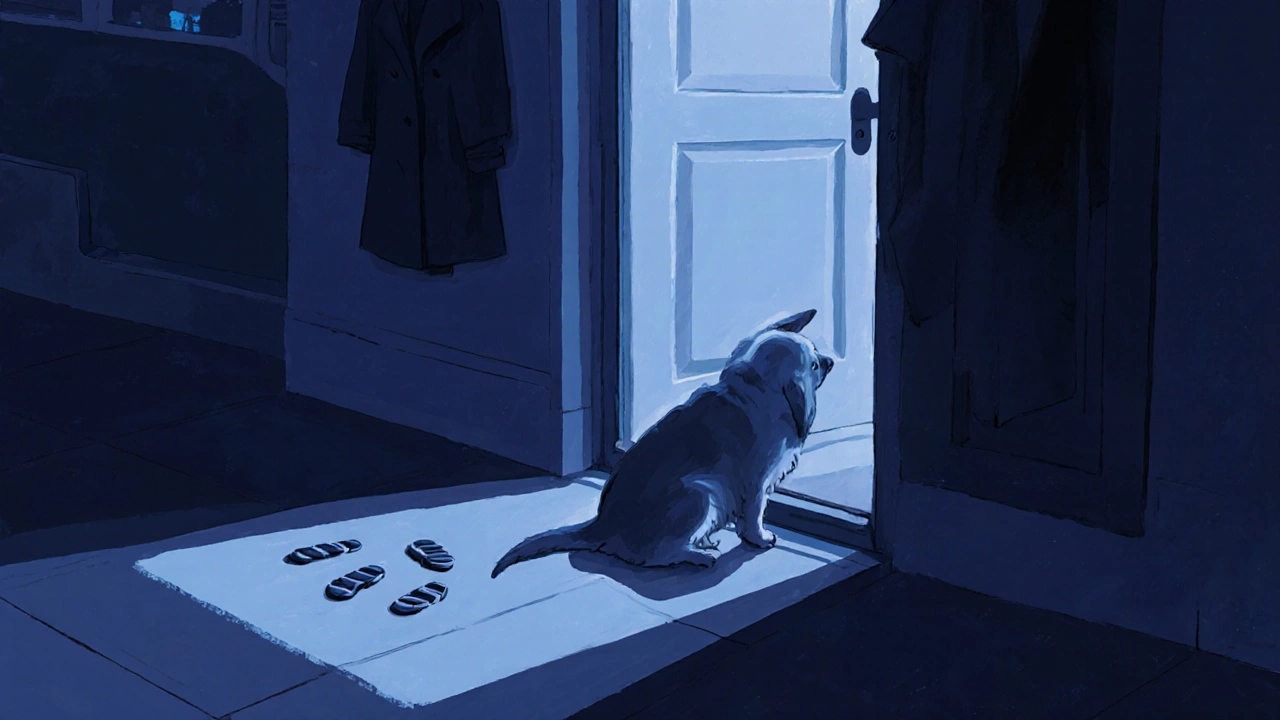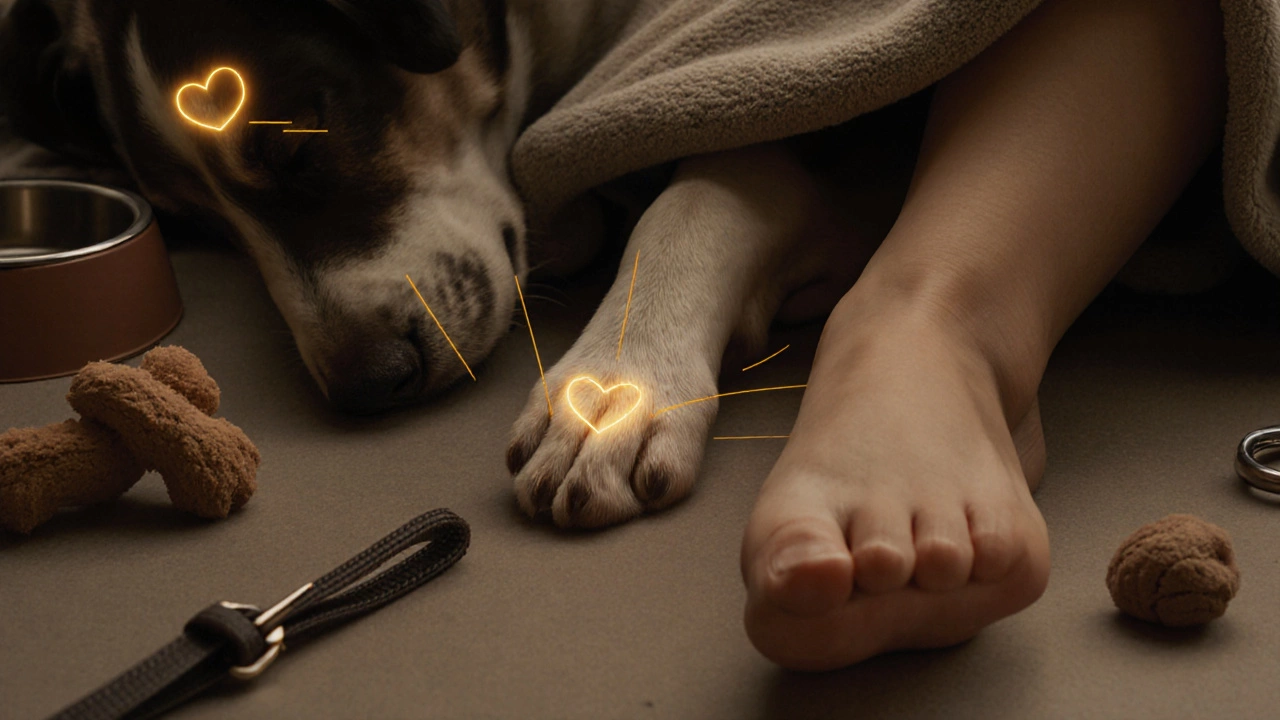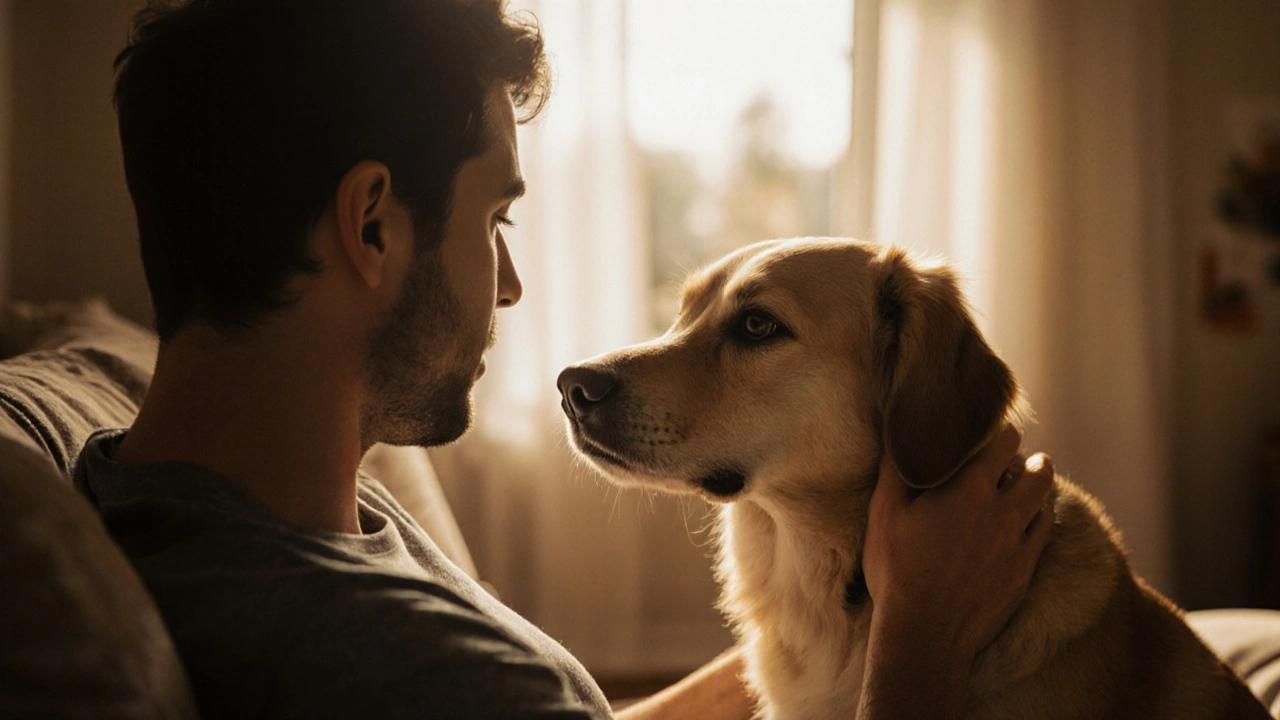Bonding Moments Calculator
See how small daily actions build your emotional connection with your dog. Based on scientific research about oxytocin release and canine bonding.
Daily Interaction Tracker
Your Bond Strength
Based on your daily interactions, your dog feels safe and connected with you.
Personalized Bonding Tips
Ever come home after a long day and your dog explodes into a tail-wagging, tongue-lolling frenzy? Or maybe you’ve caught them staring at you while you’re on the couch, like they’re trying to decode your soul. You wonder: does my dog know I love him? It’s not just a sweet thought-it’s a real question with real answers, backed by science, behavior, and decades of observation from people who live with dogs every day.
They don’t need words to feel love
Dogs don’t understand the English word "love," but they don’t need to. They read your actions like a language they’ve been fluent in since puppyhood. Your dog doesn’t analyze your tone or your vocabulary. They notice the rhythm of your footsteps when you walk in the door, the way your hand reaches for their leash before you even say "walk," the softness in your voice when you say "good boy" after they’ve been calm all afternoon. A 2015 study from the University of Tokyo showed that dogs’ brains light up in the same reward centers when they smell their owner’s scent as they do when they get food. That’s not coincidence. That’s biology saying: you are safe. You are good. You are home. Your dog doesn’t need you to say "I love you." They just need you to be consistent. To feed them on time. To pick up their toy after they drop it for the tenth time. To sit with them when they’re scared of thunder. Those aren’t chores. To them, those are declarations of love.How dogs show they know you care
If you’re wondering whether your dog feels your love, look at how they respond. Dogs mirror our emotional states. When you’re sad, they’ll nudge your hand with their nose. When you’re stressed, they’ll lie across your feet. When you laugh, they’ll bark like they’re joining in. These aren’t tricks. These are emotional responses. One common sign your dog knows you love them? They make eye contact. Not a quick glance. A long, soft gaze. That’s the same look humans use when bonding with babies. When you lock eyes with your dog, both your bodies release oxytocin-the same hormone involved in maternal bonding. It’s called the "love hormone" for a reason. Your dog isn’t just looking at you. They’re syncing with you. They also follow you around the house. Not because they’re bored. Not because they want food. But because you’re their anchor. A dog who follows you from room to room is choosing to stay close to the person who makes them feel secure. That’s attachment. That’s love.What dogs remember about you
Dogs don’t have the same memory as humans. They won’t recall your birthday or the name of your first pet. But they remember how you made them feel. They remember the person who picked them up after they got scared at the vet. The one who sat on the floor for an hour just to let them sniff their fingers. The one who never yelled, even when they chewed your favorite shoes. Research from the University of Vienna found that dogs can recognize emotional expressions on human faces-even when only half the face is visible. They can tell the difference between a genuine smile and a forced one. They know when you’re pretending to be happy. And they know when you’re really, truly content just being near them. Your dog doesn’t need you to say "I love you." But they do need you to show up. To be present. To not rush through the quiet moments. That’s how they learn: love is not a word. It’s a routine. It’s a hand on their head. It’s the way you pause before opening the door so they can walk out first. It’s the way you sigh when they snuggle too hard.
What happens when you don’t show love
Dogs don’t hold grudges. But they do learn to expect certain things. If you’re always distracted-phone in hand, TV on, never making eye contact-they start to wonder if you’re even there. They might stop trying. Stop following. Stop making eye contact. That’s not disobedience. That’s withdrawal. A dog who stops bringing you toys, who doesn’t greet you at the door, who sleeps far away from you? That’s not laziness. That’s sadness. They’ve learned that their efforts don’t get a response. And that’s harder to recover from than any bad habit. The good news? It’s never too late. Dogs forgive quickly. But they remember consistency. One week of real attention-no phone, no multitasking, just sitting on the floor with them, scratching behind the ears, talking softly-can rebuild trust faster than you think.Simple ways to show your dog you care
You don’t need grand gestures. You don’t need expensive toys or fancy treats. You need presence. Here’s what works:- Make eye contact for 30 seconds every morning. No talking. Just look. Let them look back.
- Let them sniff everything on walks. Let them take their time. That’s their way of reading the world-and you’re letting them lead.
- Touch them daily. Not just when you’re asking them to sit or come. Just a hand on their back while you’re watching TV.
- Speak to them in a calm, warm tone. Even if it’s just "good girl" or "nice boy." They hear the tone more than the words.
- Let them sleep near you. Not on your bed if you don’t want them there-but near your feet, on a blanket beside you. That proximity matters.

Why this matters for dog-friendly holidays
When you plan a dog-friendly holiday, you’re not just packing a leash and kibble. You’re packing trust. You’re packing the quiet understanding that your dog isn’t just a pet-they’re a companion who knows you better than most people do. A dog who feels safe with you will relax in new places. They’ll explore a beach without panicking. They’ll nap in a strange hotel room because they know you’re nearby. They’ll wag their tail at the sound of your voice, even if you’re miles from home. That’s not luck. That’s love. Your dog doesn’t need a fancy vacation. They need you to be fully there. To notice when they’re tired. To pause when they stop to smell a tree. To hold their head when they’re nervous about the car ride. Those moments aren’t small. They’re everything.They love you back-just differently
Your dog won’t write you a poem. They won’t send you a card on Valentine’s Day. But they’ll wait by the door for an hour after you leave. They’ll bring you their favorite toy when you’re sad. They’ll curl up against your leg like you’re their entire world. And that’s how they say it. You don’t need to ask if your dog knows you love him. Look at how they live. Look at how they choose you, every single day, even when there’s a squirrel outside. Even when it’s raining. Even when you’re not perfect. They’re not waiting for you to say the words. They’re already listening.Can dogs really feel love, or are they just being obedient?
Dogs don’t love because they’re trained to. They love because they’re wired to bond. Studies using fMRI scans show that dogs’ brains release oxytocin-the same hormone humans release when bonding with babies-when they interact with their owners. This isn’t obedience. It’s attachment. They form emotional connections that mirror human relationships.
Why does my dog stare at me so much?
When your dog stares at you with soft eyes, they’re not trying to get something. They’re connecting. That gaze triggers oxytocin release in both of you, strengthening your bond. It’s the same look a mother gives her baby. It’s a sign of trust, not manipulation.
Do dogs miss me when I’m gone?
Yes. Dogs experience separation anxiety differently than humans, but they definitely notice your absence. Their heart rates rise when you leave. They wait by the door. They may whine, pace, or sleep more. When you return, they often greet you like you’ve been gone for days-even if it’s been an hour. That’s not overreaction. That’s deep attachment.
Can a dog love more than one person?
Yes, but they usually have one primary attachment. That’s usually the person who feeds them, walks them, and spends the most quiet time with them. They can bond with others, but their strongest emotional tie is typically with one person. That doesn’t mean they don’t care about others-they just don’t rely on them the same way.
What if I didn’t have my dog from puppyhood? Can I still build this bond?
Absolutely. Dogs bond at any age. It takes patience, not time. Spend 15 minutes a day doing calm, focused activities: sitting quietly together, gentle petting, slow walks where you let them lead. Avoid training or corrections at first. Just be a safe, predictable presence. Within weeks, you’ll see the difference in their eyes.
